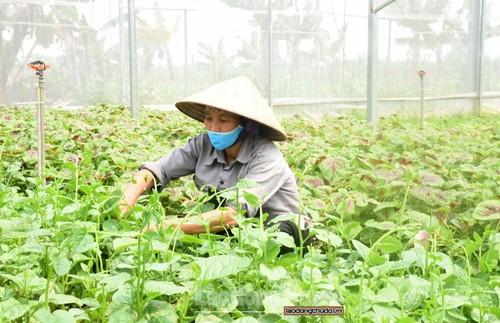 The movement to involve farmers in shared production and trading has greatly contributed to poverty reduction and social security in rural areas. (Photo: laodongthudo.vn) The movement to involve farmers in shared production and trading has greatly contributed to poverty reduction and social security in rural areas. (Photo: laodongthudo.vn) |
Since it began, the movement has significantly reduced poverty, enhanced social security in rural areas, generated jobs, and increased incomes. It has also made farmers more self-reliant, better at overcoming difficulties, more innovative, and more productive for their homeland and country.
Farmers who excel in production and trading have taken the initiative in restructuring crops and livestock, tapping local potentials and strengths, and investing in and applying high-tech to production to create higher profits and boost the rural economy. Farmers donate more than 420 million USD, 3 million working days, and hundreds of hectares of land each year to building new-style rural areas.
Nguyen Thi Kim Hoa, Head of the Secretariat of the Vietnam Farmers’ Association, said, “Every year, 3.6 million farm households are named ‘Good farm households in production and business’ for using large-scale production models to generate billions of VND in income.”
“The number of billionaire farmers is on the rise. These farmers have become a new class of farmers - ‘digital farmers’ or ‘technology farmers’ - leading others to get rich, creating jobs, increasing farm incomes, promoting new-style rural building, ensuring political security, social order, and safety in rural areas, and defending national sovereignty over sea and islands through their dynamism, creativity, venturesome spirit, determination to escape poverty, and ambition to be self-reliant and make a fortune honestly,” Hoa said.
Farmers are supplementing their traditional farming experience with smart devices and modern technology. Good farming today requires a venturesome spirit and a readiness to seize opportunities, as well as knowledge, skills, experience, and sound economic thinking.
In the past, after each harvest farmers waited for traders to come buy their produce. Now they take the initiative to sort and preserve what they produce, and process it into a variety of value-added products, while actively seeking customers in Vietnam and abroad.
Ly Van Bon, the owner of the Bay Bon ray-finned fish processing workshop in Can Tho city, told VOV, “At first I only raised fish. Due to unstable prices, I decided to raise breeders and set up a processing facility for self-sufficiency. When we faced difficulties in output, we started combining fish farming and tourism.”
 Nguyen Duy Hung is Deputy Head of the Party Central Committee’s Economic Commission (Photo: vnexpress.net) Nguyen Duy Hung is Deputy Head of the Party Central Committee’s Economic Commission (Photo: vnexpress.net) |
Nguyen Duy Hung, Deputy Head of the Party Central Committee’s Economic Commission, said that there are many models in which farmers are agricultural workers, agricultural researchers, and use e-commerce and new technologies to sell their own products.
“It’s necessary to improve farmers’ knowledge and ability to respond to the requirements of the socialist-oriented market economy so that they can truly master their own production process,” said Hung.
According to the Vietnam Farmers' Association, good farm households provide more than 5 million jobs for local workers and help more than 200,000 families escape poverty each year.
The Party Resolution on agriculture, farmers, and rural areas until 2030 with a vision to 2045 calls agriculture “a national advantage and the backbone of the economy” with farmers as the center of rural development and the new rural building process. Today’s farmers are constantly improving their knowledge, skills, and capacity, and adopting new ways of thinking and new technologies.